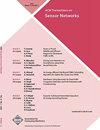一种基于Voronoi图和Q学习的无线电不规则性下中继节点布置方法
IF 4.7
4区 计算机科学
Q2 COMPUTER SCIENCE, INFORMATION SYSTEMS
引用次数: 0
摘要
工业无线传感器网络(IWSN)已被广泛应用于需要高可靠性和实时无线传输的工业应用中。为了优化中继节点布局(RNP),已经做了很多工作,这决定了IWSN的底层拓扑结构,从而影响了网络性能。然而,现有的RNP算法使用固定的通信半径来离线计算部署结果,而忽略了无线电环境在不同位置之间可能会发生巨大变化,也称为无线电不规则性。为了解决这一限制,本文提出了一种基于Voronoi图和Q学习的RNP(VQRNP)方法。VQRNP不使用固定的通信半径,而是使用Q学习算法来动态更新测量区域的无线电环境,使用基于Voronoi图的方法来估计未测量区域的无线环境,并基于VGG估计的结果,提出了覆盖扩展位置选择算法来放置RN以扩展所部署网络的覆盖。这样,VQRPN方法可以很好地适应无线电环境的变化,并大大加快部署过程。大量仿真验证了VQRNP在可靠性方面显著优于现有的RNP算法。本文章由计算机程序翻译,如有差异,请以英文原文为准。
A Voronoi Diagram and Q-Learning based Relay Node Placement Method Subject to Radio Irregularity
Industrial Wireless Sensor Networks (IWSNs) have been widely used in industrial applications which require high reliable and real-time wireless transmission. A lot of works have been done to optimize the Relay Node Placement (RNP), which determines the underlying topology of IWSNs and hence impacts the network performance. However, existing RNP algorithms use a fixed communication radius to compute the deployment result at once offline, while ignoring that the radio environment may vary drastically across different locations, also known as radio irregularity. To address this limitation, we propose a Voronoi diagram and Q-learning based RNP (VQRNP) method in this paper. Instead of using a fixed communication radius, VQRNP employs the Q-learning algorithm to dynamically update the radio environment of measured areas, uses a Voronoi diagram based method to estimate the radio environment of unmeasured areas, and proposes a coverage extension location selection algorithm to place RNs so as to extend the coverage of the deployed network based on the results estimated by VGG. In this way, the VQRPN method can adapt itself well to the variation of radio environment and largely speed up deployment process. Extensive simulations verify that VQRNP significantly outperforms existing RNP algorithms in terms of reliability.
求助全文
通过发布文献求助,成功后即可免费获取论文全文。
去求助
来源期刊

ACM Transactions on Sensor Networks
工程技术-电信学
CiteScore
5.90
自引率
7.30%
发文量
131
审稿时长
6 months
期刊介绍:
ACM Transactions on Sensor Networks (TOSN) is a central publication by the ACM in the interdisciplinary area of sensor networks spanning a broad discipline from signal processing, networking and protocols, embedded systems, information management, to distributed algorithms. It covers research contributions that introduce new concepts, techniques, analyses, or architectures, as well as applied contributions that report on development of new tools and systems or experiences and experiments with high-impact, innovative applications. The Transactions places special attention on contributions to systemic approaches to sensor networks as well as fundamental contributions.
 求助内容:
求助内容: 应助结果提醒方式:
应助结果提醒方式:


